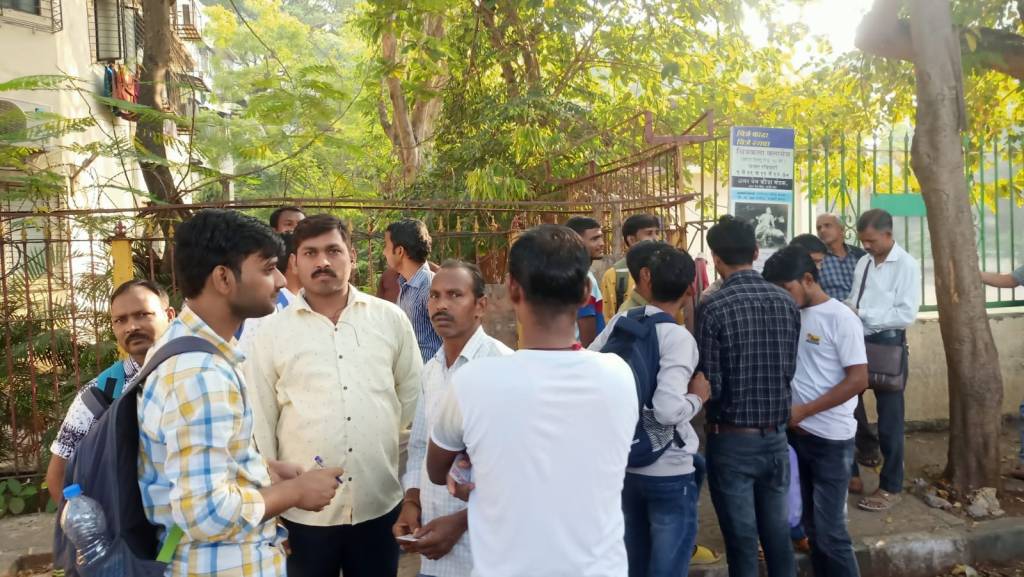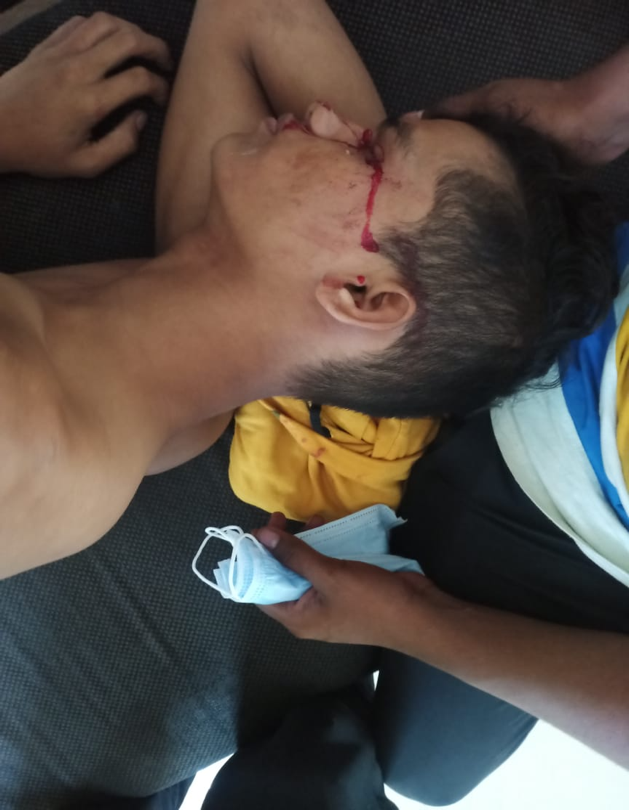लेबर नाका के दृश्य प्रस्तुतिकरण के लिए चित्र
मुंबई जहाँ हमेशा काम ठीक-ठाक चलता था लेकिन अभी काम की स्थिति इतनी अधिक ख़राब हो गयी कि वर्कर को महीने में 10 से 15 दिन ही काम मिल रहा है, उसमे भी उनको काफी कम रेट पर काम करना पड़ रहा है. बाजार में आयी मंदी को समझने के लिए दिहाड़ी मजदूरों से बात की, वहीं उनके नज़रिये से काम में आयी मंदी को जानने की कोशिश की। समीर (नाम बदल दिया हैं) मुंबई में निर्माण कार्य में मिस्त्री का काम करते हैं. समीर बिहार के जमुई के रहने वाले हैं. उनको मुंबई में काम करते हुए 20 साल हो गए हैं. समीर ने बताया “कोरोना के बाद से काम बिलकुल ठंडा है. लॉकडाउन ने सभी की कमर तोड़ दी. हम जैसे गरीब आदमी पर तो दोहरी मार पड़ी है, एक तो काम नहीं, दूसरी मंहगाई अलग, अब बताओ गरीब आदमी क्या खाये, बस दाल रोटी चल रही इतना बहुत है. समीर ने बताया, नाके की हालत यह हो गयी है, अब सिर्फ 50 प्रतिशत लोगों को ही काम मिल रहा है. इसके बाद पैसा भी कम मिल रहा है. फ़रवरी तक यह काम ऐसे ही रहेगा, उसके बाद थोड़ा चलेगा, लेकिन मई, जून, जुलाई में भरपूर काम होता है”.
समीर ने अपने शुरुआती दिनों का भी ज़िक्र किया, उन्होंने बताया, “मैं 25 साल पहले मुंबई आया था, उस समय यहाँ पगार 70 रुपए मिलता था, बस का किराया 2 रूपए लगता था. उस समय मंहगाई भी काफी कम थी, 2 रूपए में चावल, आटा मिल जाता था, वहीं तेल भी काफी सस्ता था. लेकिन आज हालत यह हो गए 12000 रूपए पगार है तब भी पूरा नहीं पड़ता है. लोग पगार तो देखते हैं, लेकिन महंगाई कोई नहीं देखता है कि आज 50 रुपए में चावल, 180 रुपए में तेल और सब्जी भी इतनी महंगी है, उस पर रूम भाड़ा, बिजली बिल, पानी बिल अलग से, वहीं जिसमे तौला जाता है उसमे भी गड़बड़ी रहती है”. फिर हमने जानना चाहा कि मार्केट में स्पर्धा क्यों है? उन्होंने बताया, “जो 15 दिन से बैठा हुआ है वो क्या करेगा, आप ही बताओ, वो मजबूरी मैं कम रेट पर चला जाता है”.
वहीं एक वर्कर जिनका नाम अशोक है (नाम बदल दिया हैं), उन्होंने बताया, “मैं बजाज में काम करता था और 25 हज़ार रूपए बंधी सैलरी मिलती थी. लेकिन कोरोना आया और फिर भारत-चीन का भी व्यापार बंद होने से हम लोग को नौकरी से निकाल दिया गया, उस समय 500 लोगों को नौकरी से निकाला गया था, उसमे से एक मैं था. अब कोई काम नहीं है जिस वजह से हेल्पर का काम करना पड़ रहा है. यहाँ काम की स्थिति यह है कि आज इस दिसंबर महीने के 14 दिन हो गए हैं, लेकिन अभी तक 3 हाज़री मिली है. परिवार भी यहीं रहता है आगे का कोई रास्ता नहीं दिख रहा है. बच्चे की पढ़ाई का भी सोचना है और पढ़ाई-लिखाई भी पैसे वालों की हो गयी है, मजदूर आदमी बच्चों को पढ़ा भी नहीं सकता है. वहीं बीएमसी के स्कूलों की हालत बिहार के स्कूलों जैसी हो गयी है. गरीब आदमी का कुछ नहीं है, गरीब आदमी और पीछे धकेल दिया जा रहा है. वहीं बिहार भी नहीं जा सकता, वहां पानी के अलावा कुछ बचा ही नहीं है, और वो पानी पिने के भी लायक नहीं है”.
एक वर्कर जिनका नाम संजीव है (नाम बदल दिया हैं), वो पटना के रहने वाले हैं. उन्होंने बताया वो ड्राइवर भी हैं. उन्होंने कहा, “वर्कर अभी कम हैं, क्यूंकि अभी गेहूं बोवाई का टाइम भी चल रहा है, लेकिन अब वर्कर आने शुरू हो गए हैं. वहीं काम को लेकर उन्होंने कहा, काम तो बहुत ठंडा है पिछले महीने 10 दिन काम किया था. इस बार देखो कितने दिन मिलता है. अभी घर पैसे भी नहीं भेज पाता हूँ, क्यूंकि अपना ही इतना खाना खर्चा हो जाता है”. उन्होंने काम ठंडा होने की एक और वजह बताई कि अभी लोकल लोगो ने काम करवाना बंद कर दिया है. पहले लोकल लोगों के घरों में (घर खाते मैं) बहुत काम रहता था वो नाके पर आकर ले जाते थे लेकिन अब ऐसा बहुत कम है. उन्होंने पगार को लेकर बताया, अभी हेल्पर की पगार तो 700 से 800 चल रही है. लेकिन काम कम होने की वजह से कॉन्ट्रक्टर 500 या 550 रूपए पर ले जाते हैं. उन्होंने ये भी बताया की, कम पैसे पर सिर्फ यूपी, बिहार, झारखण्ड के मजदूर जाते हैं बाकी गुजरती और मारवाड़ी नहीं जाते हैं. वहीं उन्होंने बताया, पहले एक लोग काम करता था, सब बैठकर खाते थे, लेकिन अभी 2 लोग काम करते हैं, फिर भी पूरा नहीं होता है. जब ठेकेदार देखते है किसी वर्कर को ६-७ दिन काम नहीं मिला है, तो उसकी मजबूरी को देख कर उसे कम पैसों मै काम पर ले कर जाते है.
कैलेश मंडल (नाम बदल दिया हैं) मुंबई में निर्माण कार्य करते हैं. उन्होंने बताया कि “मुझे मुंबई में काम करते हुए 35 साल से ज़्यादा हो गए हैं, लेकिन इस तरह की चुनौतियों का सामना पहली बार कर रहा हूँ. आज काम की कमी तो मार ही रही है, उससे ज़्यादा मंहगाई मार डालेगी. सब्ज़ी इतनी मंहगी हो गयी है कोई सब्ज़ी लेने जाओ 100 रूपए खर्च हो जाते हैं. चावल लेने जाओ तो 50 से 60 रूपए किलो वहीं तेल, गैस, मसाले, दाल सब कुछ इतना मंहगा हो गया है”. वहीं कैलेश मंडल पुराने दिन याद करके बताते हैं, कि “आज मैं लगभग 50 साल का हो गया हूँ. जब मैं मुंबई में आया था तो मेरी उम्र काफी कम 13 साल थी, मुंबई में शुरूआती दिनों में मुझे काम भी नहीं मिलता था. इधर-उधर घूम कर चला जाता था. उस समय नाके पर भी बहुत कम काम हुआ करता था. उस समय मैं गोल-देओल नाके पर काम किया करता था, रूम से उठकर 6 बजे बस पकड़ कर जाया करता था. उस वक़्त हेल्पर के तौर पर मुझे 32 रूपए मिला करते थे. लेकिन उस समय 32 रूपए भी बहुत हुआ करते क्यूंकि इतनी मंहगाई नहीं थी, लेकिन आज तो मंहगाई ने कमर तोड़ रखी है.”
जब कैलेश मंडल जी से सवाल किया, आप मुंबई ही काम करने क्यों आये थे, क्या गांव में काम नहीं था और आपको कौन लेकर आया था? उन्होंने बताया “क्यूंकि गांव में किसी के पास ज़मीन तो थी नहीं, अगर किसी के पास थी भी, तो एक एकड़ या दो एकड़, वहीं वहां दो ही तरह का उत्पादन होता है, गेहूं और धान, अब उसमे क्या होता है, और उस काम में कितने लोग काम कर सकते हैं, बाकी किसान की हालत तो आप देख ही रहे हैं. इस वजह से यहाँ पड़ा हूँ. मेरा भाई मुझे लेकर आया था, इसी तरह कई लोगों को मैं भी लाया हूँ. जब गांव जाता था, तो आसपास के लोग पूछते थे, क्या मुंबई में काम मिलेगा? तो उनसे कह देता था, हाँ चलो बहुत काम है. इसी तरह लोग आते गए”. उन्होंने कहा, “यहाँ इस नाका पर सभी झारखण्ड के लोग हैं सब किसी न किसी के साथ आये हैं”. कैलेश मंडल ने ये यह भी बताया, यहाँ ऐसा कोई नहीं जिसकी थोड़ी बहुत खेती न हो, लेकिन बताता कोई नहीं है. मैंने सवाल किया वहां आसपास इस तरह का काम नहीं था ? उन्होंने बताया, “वहां काम बारिश के मौसम में होता है, क्यूंकि वहां नमी नहीं होती है, लेकिन मुंबई में हमेशा काम होता है क्यूंकि यहाँ ज़मीन में नमी रहती है, इसलिए यहाँ हमेशा काम चलता रहता है और बताया कि मुंबई और वहां के काम में फ़र्क़ भी है, अगर गांव में आप मिस्त्री के काम करते हैं तो यहाँ फिर से हेल्पर के तौर पर शुरू करना पड़ेगा”.
जब उन्हें पूछा काम क्यों कम है क्या लगता है? उन्होंने बताया “बहुत सारी वजह है, एक तो कोरोना के बाद सबकुछ बंद हो गया है, अभी लोगों के पास पैसा भी नहीं है. बिल्डिंग बहुत सारी बनी खड़ी हैं, लेकिन खरीदने वाला कोई नहीं है, क्यूंकि लोगों ने अपने पैसे खर्च करने बंद कर दिए हैं. जिस वजह से कई लोगों को काम नहीं मिल पाता है, उन्होंने बताया मैं ही घर बैठा था एक दिन का 800 खर्च था, काम दो पैसे का नहीं था. जनवरी तक ऐसा ही ठंडा रहेगा, क्यूंकि अभी बच्चों के एग्जाम भी आने वाले हैं उसके बाद काम शुरू होगा. अभी हालात ऐसे हैं कि कई लोग बग़ैर काम मिले वापस घर चले जाते हैं. काम पहचान से मिल रहा है. अभी नाके पर स्पर्धा भी बहुत ज़्यादा है क्यूंकि काफी भीड़ और नए लोग नाके पर आये हैं. पहले हम लोग दिहाड़ी काम नहीं लेते थे लेकिन आज हेल्पर 500 पर जा रहा है, क्यूंकि वो सोचते हैं खाली बैठने से कोई फायदा नहीं, अगर खाली बैठोगे तो 300 रूपए दिन का खर्चा और 500 रूपए यह भी जायेंगे, ऐसे में आदमी सोचता है चलो खाली बैठने से तो अच्छा है, कुछ तो आएगा, ऐसे ही किसी तरह मैनेज करते हैं”.
अभिजीत यादव (नाम बदल दिया हैं) मुंबई में कंस्ट्रशन में मिस्त्री का काम करते हैं. उनकी उम्र अभी 24 साल है. वो उत्तर प्रदेश के जिला बलरामपुर के रहने वाले हैं. उन्होंने कक्षा 7 तक पढ़ाई की है. पढ़ाई को लेकर उनका कहना था, “मैं पढ़ाई में ठीक-ठाक था, लेकिन घर की बिगड़ी परिस्थितियां देखकर पढ़ाई छोड़नी पड़ी, उन्होंने बताया मेरे बड़े भाई की शादी के बाद वो अलग हो गए, इसलिए आजीविका की तलाश में मुंबई आना पड़ा. मेरे माता -पिता आज भी खेतिहर मजदूर हैं, अब उन्होंने भैंस खरीद ली है जिससे घर का खाना खर्चा चलता है”. अभिजीत ने बताया कि जब वो पहली बार मुंबई आये थे तो उनकी उम्र 16 साल थी. पहली बार उन्होंने सब्ज़ी की दुकान पर काम किया था. अभिजीत पुराने दिन याद करके बताने लगे उस समय पुलिस से भी डर लगता था, क्यूंकि उनकी उम्र बहुत कम थी. उन्होंने बताया एक दो बार ऐसा भी हुआ, पुलिस को देखकर उनको मेज़ के नीचे छुपना पड़ा, लेकिन धीरे-धीरे मुंबई में रहना सीख लिया. अब उनको मुंबई में 6 साल हो गए हैं. उन्होंने बताया इन 6 सालों में अच्छे-बुरे सभी तरह के अनुभव बने है. अभिजीत बताने लगे “एक बार काम कर रहा था, वहीं पर एक वर्कर मशीन से सरिया काट रहा था, अचानक उसके हाँथ से मशीन फिसली और गर्दन तक पहुँच गयी, जिससे उसकी गर्दन कट गयी, एक महीने के बाद वर्कर की मौत हो गयी थी. उन्होंने बताया तब वो देखकर सदमे की वजह से एक महीने काम नहीं कर पाया था, लेकिन घर पर भी कब-तक बैठता फिर काम करना पड़ा. फिर वो नाका पर काम की कहानी बताने लगे”. अभिजीत ने बताया पहले वो हेल्पर का काम करते थे लेकिन धीरे- धीरे मिस्त्री का काम सीखा. मैंने पूछा हेल्पर और मिस्त्री के काम में कितना फ़र्क़ है और कितना टाइम लगा. तो उन्होंने बताया कि “हेल्पर के काम में ज़िम्मेदारी कम होती है सिर्फ सामान ढोना होता है, वहीं मिस्त्री के काम में बहुत ज़िम्मेदारी और दिमाग लगता है क्यूंकि मुंबई में काम में फिनिशिंग भी देखी जाती है. मिस्त्री का काम सीखने में काफी टाइम लगता है. मुझे काम सीखने में चार साल लग गए”.
काम के बारे में पूछा कैसे चल रहा है, उन्होंने बताया “काम अभी बहुत हल्का है एक दिन काम करो 2 दिन बैठकर खाओ, काम इस तरह चल रहा है. एक महीने में 15 से 20 दिन काम मिलता है. पहले रूम पर रहने वाले सभी लोग काम पर जाया करते थे, लेकिन अभी किसी दिन एक जाता है तो किसी दिन एक, वहीं काम कम होने की वजह से नाके पर स्पर्धा भी होने लगा है. एक वर्कर किसी काम के लिए 700 की बात करता है वहीं दूसरा व्यक्ति उसी काम के लिए 600 में जाने के लिए तैयार हो जाता है. आज की हालत यह हो गयी है वर्कर 500 रूपए पर भी काम पर जानें को राज़ी हो जाते हैं. उनका कहना था काम नहीं मिलने से यही अच्छा है. कुछ नहीं तो मुंबई का खाना खर्चा तो चलेगा. वहीं अभिजीत बताने लगे “मुंबई में अब रहना मुश्किल हो रहा है. इतनी ज़्यादा महंगाई हो गयी है. एक दिन में 200-250 रूपए खर्च हो जाते हैं. हम लोग तीन टाइम खाना खाते हैं और खाना बनाते हैं, तब इतना खर्च होता है, अगर बाहर खाने जाएँ तो एक बार में 100 रूपए खर्च होते हैं. वहीं दिन में चाय और गुटखे का भी रुपया खर्च होता है. इसके अलावा रूम रेंट अलग होता है. महीने के अंत में कुछ बचता ही नहीं है. अब घर भी कुछ नहीं भेज पाता हूँ. उन्होंने नाके पर दिखाते हुए कहा, आप खुद देख लो 10 बजने वाला है लेकिन अभी तक आधे लोगों का काम नहीं लगा है. अब यह सब लोग बैग उठाकर घर जायेंगे। यह स्थिति बन गयी है”.
जब काम की उपलब्धता लेकर जानने की कोशिश की, क्यों मार्केट ठंडा है, तो बताया “अभी लोग काम नहीं करा रहे हैं. कोरोना के बाद से लोगों के अंदर डर है कहीं फिर से कोरोना वापस ना आ जाये, इस वजह से लोग पैसा बचाना चाहते हैं. इसलिए वो काम नहीं करा रहे हैं. दूसरी बात हर जगह इतनी महंगाई हो रखी है सब कुछ इतना मंहगा है अब लोग ऐसे में काम कराना ही नहीं चाहते हैं”.
*यह ब्लॉग में वर्कर की पहचान को गोपनीय रखने के लिए नाम बदल दिए है.

लेबर नाका आउट रीच के दृश्य प्रस्तुतिकरण के लिए चित्र
– यह ब्लॉग गुफरान खान द्वारा लिखा गया है, वो आजीविका ब्यूरो के मुंबई सेंटर के साथ जुड़े है और प्रवासी मजदूरों के मुद्दों पर कानुनी सुरक्षा के लिए काम करते है.


